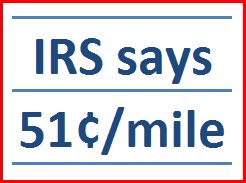IRS Guidelines to Save for Your Next Car Replacement
Once your present car is paid off, you should begin to save toward the purchase of your next one. You knew that; the question is how much and over what period of time.
Think beyond gas
When considering the cost of going somewhere, "youngsters" who haven’t bought more than one car yet will often talk in terms of, say, $10 “for gas.” If you never think beyond gas, then it will always be difficult to pay for the other necessary costs of vehicle ownership, especially up-front costs and either loan or lease payments.
Beyond gas, I find that insurance costs roughly as much, but that will depend on how much you drive and what the insurance company thinks of your driving record. For most people, depreciation, maintenance and repairs will comprise another slice of the automobile expense pie nearly equal to that of fuel costs. Start out with three equal slices and adjust it only if you find that your expense history warrants it.
IRS standard mileage rates
In the U.S., the IRS establishes a standard rate per mile for reimbursing employees for business use of a personal vehicle. This rate is updated periodically (e.g., it was 51¢ per mile as of January 2011) to reflect the total cost of owning and operating a typical vehicle. They broke that down into 19¢ for variable costs and 32¢ for fixed costs. Fixed costs are those paid whether the car is driven or not, like insurance and depreciation (i.e. loan or lease payments). Variable costs depend on the number of miles driven, like gas, maintenance and repairs. These two categories match up exactly with the three that I personally track (previous paragraph), but the important figure is the bottom line, which at the end of 2011 was 55½¢ per mile.

“Charge yourself” 56¢ per mile
At the end of each month you should look at the odometer to see how many miles you drove last month. Then “charge yourself” 56¢ per mile for that mileage. Put that amount into a designated savings account or track it in some other way. You can tap that account for fuel, insurance, maintenance and other car expenses but nothing else. If you become tempted by the big accumulation there, just look up the price of the car you’re saving up for next. That ought to set your priorities straight!
More articles about car buying
- New and Used Car Buying and Selling Tips
Articles on HubPages about Vehicle Buying and Selling Tips. - Buying New and Used Cars
Articles about how to buy or sell a new or used car. Includes tips for taking out a loan, getting the best deal, and avoiding lemons. - Buying and Selling New and Used Cars
Articles on HubPages about Vehicle New-or-Used. - Buying Vehicles
Articles on HubPages about Buying Vehicles.







